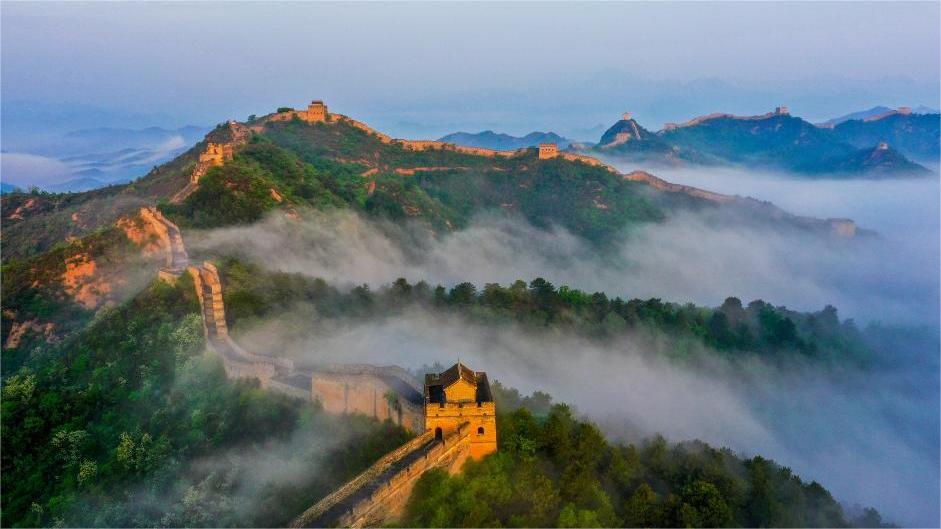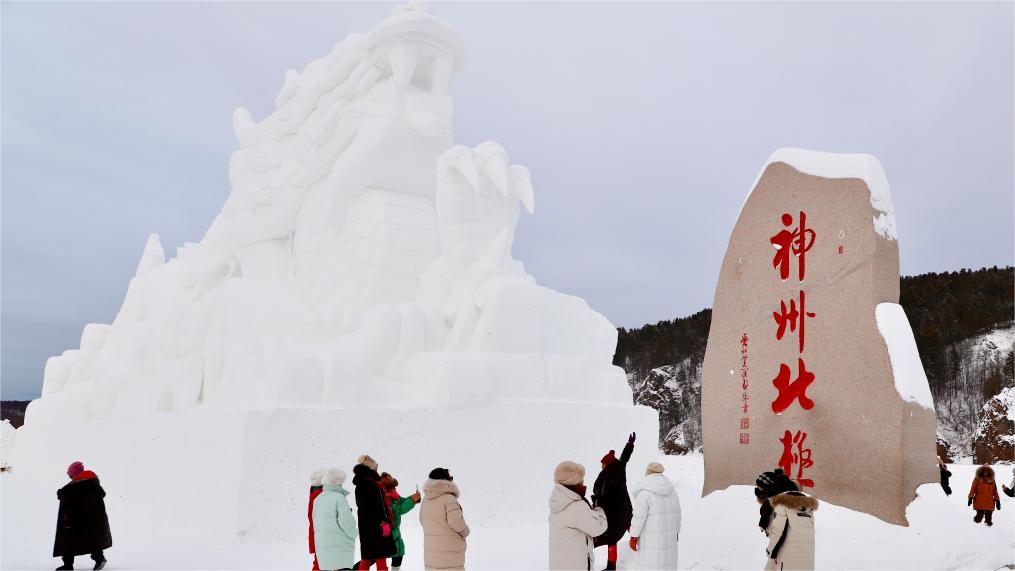China's Blue Circle environmental initiative gives new solution to marine plastic waste
If plastic waste is dumped into the sea, it will gradually break down into microplastics, exerting continuous and permanent adverse impacts on the environment. How can plastic waste be recycled and turned into useful resources?
The Blue Circle environmental initiative, a marine plastic waste program launched in east China's Zhejiang province, has given the answer to the question.
The program uses blockchain technology and the Internet of Things to comprehensively monitor the entire lifecycle of plastic waste, encompassing collection, regeneration, re-manufacturing and re-sale.
This year, the program was honored with the 2023 Champions of the Earth award - the United Nations' most prestigious environmental recognition - by the United Nations Environment Program (UNEP), from a pool of 2,500 nominations.
During the twilight hours, fishing boats returned from the sea and docked on a beach of Huangjiao Island of Taizhou, Zhejiang province. A captain surnamed Chen, while unloading the catch, instructed his crew to empty the used fishing nets, foam plastics, plastic bottles, plastic bags, and marine debris collected along with the fish out of the boat, and send them to a nearby place called Xiaolan Zhijia, which literally means little blue house.
Xiaolan Zhijia is a collection and storage site for marine debris. It collects, sorts and compacts waste materials collected from the sea. To encourage wider participation, Xiaolan Zhijia offers much higher prices for marine debris compared to regular waste.
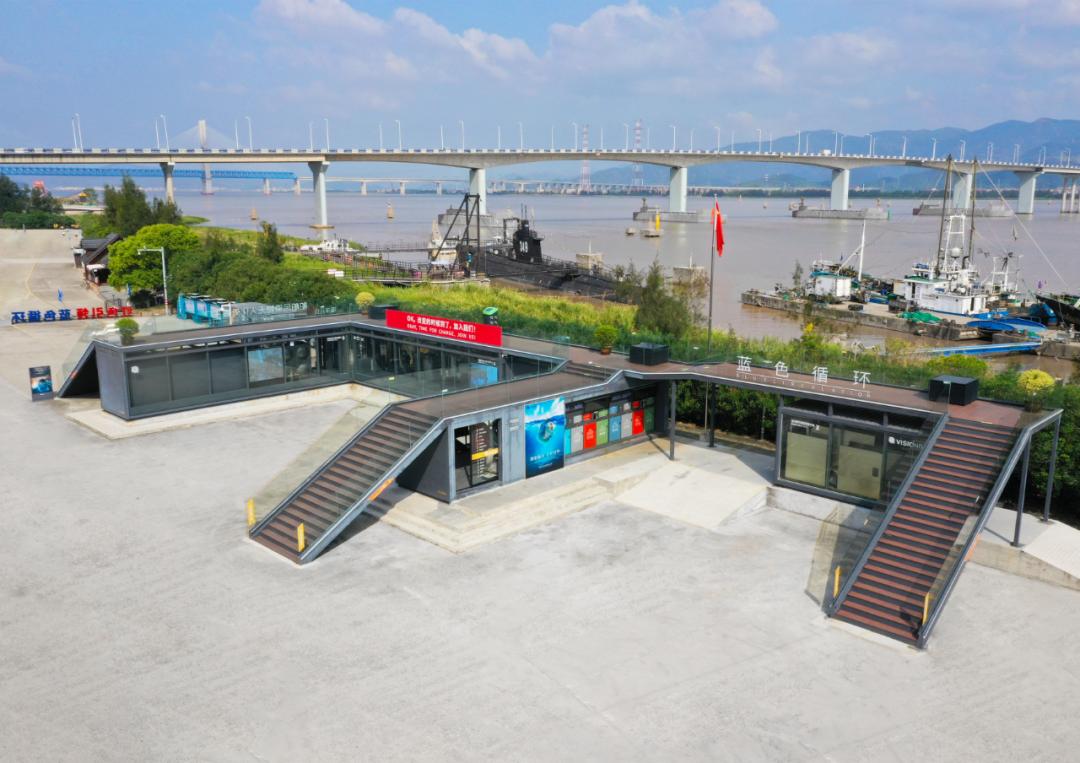
Photo shows an "Ocean Cloud Warehouse" in Jiaojiang district, Taizhou, east China's Zhejiang province. (Photo from the official account of Taizhou ecology and environment bureau on WeChat)
At the port of Jiaojiang district, Taizhou, there is a facility in the shape of a box. It is called "Ocean Cloud Warehouse" and is an intelligent processing system that can sort, temporarily store, purify, and pre-process waste. The volume of marine debris is compressed by up to 90 percent in the warehouse after crushing, which significantly lowers transportation costs.
The collected marine waste will be sent to Veolia Huafei Polymer Technology (Zhejiang) Co., Ltd. located in Anji county, Huzhou, Zhejiang province. The company is a member of a non-profit organization called "Blue Alliance" and has been awarded the certification for marine plastic recycling by an international accreditation body.
According to Fu Xianwei, the company's operations director, the company has basically achieved automated production, and its products are standardized and high-quality.
Taking plastic bottles as an example, Fu told People's Daily that the bottles are sorted, thoroughly cleaned, melted and reshaped into plastic pellets, so that they can be recycled.
So far, Veolia Huafei Polymer Technology (Zhejiang) Co., Ltd. has processed over 10 million of plastic bottles collected from the ocean. By adjusting the granulation technique, the company is able to produce recycled plastic particles of various grades, including those suitable for food contact.
Products made from marine plastic waste have higher added value. Hangzhou Xinsheng Printing and Dyeing Co., Ltd., also a member of the "Blue Alliance", transforms marine plastic particles into various fabrics.
Fu Xiaoling, marketing director of the company, said, "Thanks to the technological breakthroughs we have made, these fabrics and garments made from marine plastic are no inferior to other recycled clothing in terms of quality and performance, and they are highly sought after in the international market."
Products made from marine plastic are stamped with a unique QR code bearing the words "Produced by Blue Alliance" before leaving the factory. This serves as an exclusive identification for each product.
After a People's Daily reporter scanned the QR code on a document bag made from marine debris, a picture popped up on the phone, which said the document bag contained 6.5 grams of marine plastic and the purchase of it would reduce the production of 0.32 plastic bottles and 8.45 grams of carbon emission. The entire process of how the raw material of the bag was collected and made into a commodity was shown on the phone, too.
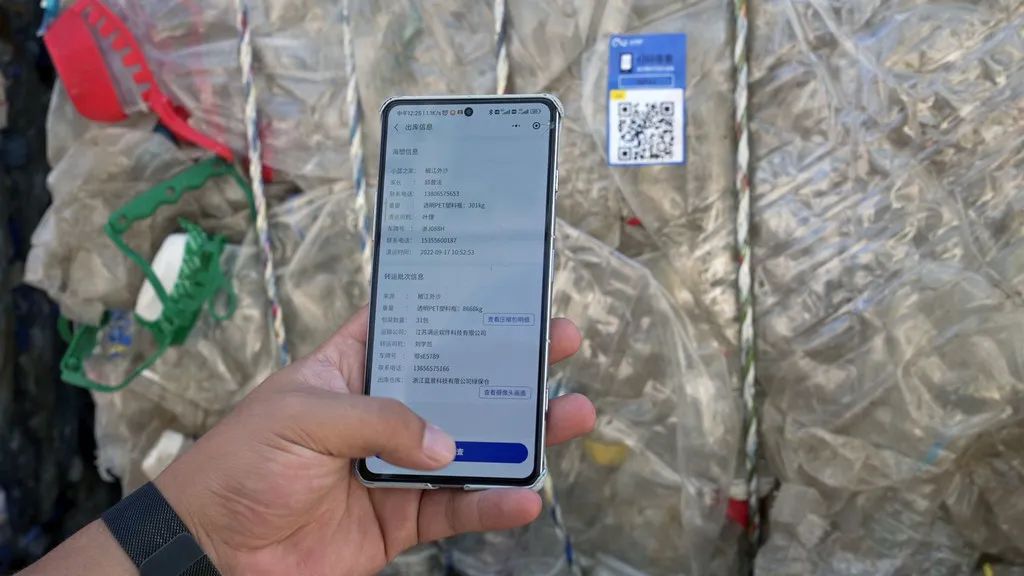
The flow of marine plastic waste can be traced via a QR code. (Photo from the Blue Circle initiative)
Chen Guanghui, co-founder of Zhejiang-based technology company VisionBlue and one of the initiators of the Blue Circle initiative, noted that many domestic and international companies are willing to purchase higher-priced marine plastic recycled particles and products in order to fulfill their social responsibilities.
However, it is difficult to determine whether these plastic particles actually come from marine plastic waste with traditional methods. Therefore, the company has developed a blockchain-based visual traceability system to solve this problem.
So far, 237 industrial enterprises and 10,200 ships in Zhejiang have joined the Blue Circle initiative. The program has also been participated by 61,800 people living along the coast, including seniors, fishermen, and volunteers.
The program has collected and processed 10,900 tons of marine waste, including 2,254 tons of plastic waste, resulting in a reduction of approximately 2,930 tons of carbon emissions.
Frontline collectors have increased their annual income by about 13,000 yuan ($1,845.81) thanks to the program, and fishermen have obtained over 100 million yuan in low-interest green loans through their green credits of waste collection.
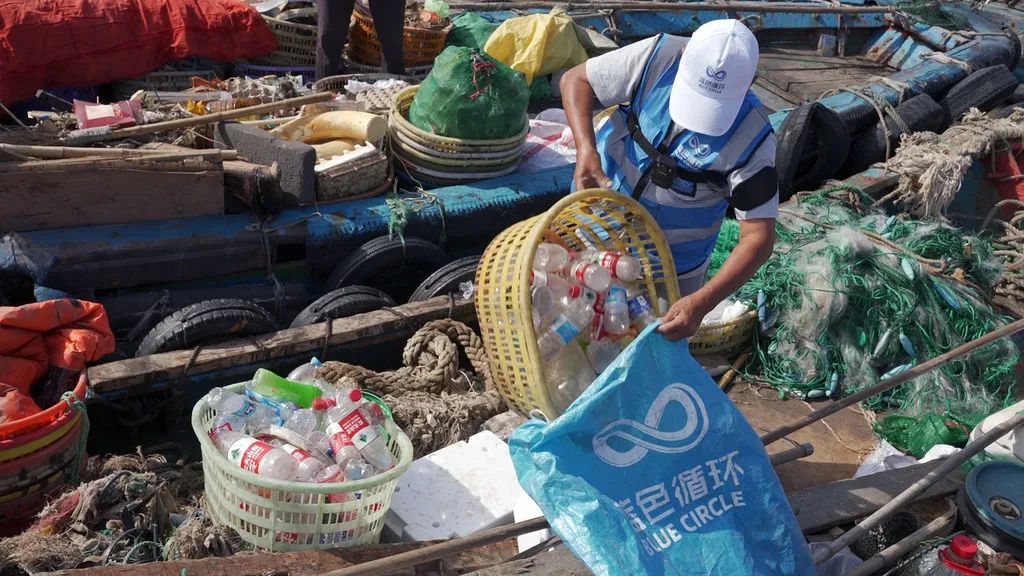
A fisherman collects and sorts marine plastic waste encouraged by the Blue Circle initiative. (Photo from the Blue Circle initiative)
Photos
Related Stories
- China backs G20 goal to triple global renewable energy by 2030
- Yichun in NE China blazes new path of green development
- Meet the town of Meicheng in East China
- China releases the first list of 789 important habitats for terrestrial wildlife animals to strengthen protection
- Dispute resolution system sees high success rate
- With dual carbon goal and its own pace, China moving toward green transition
Copyright © 2024 People's Daily Online. All Rights Reserved.






